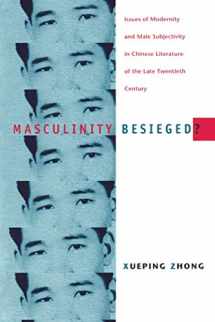
Masculinity Besieged?: Issues of Modernity and Male Subjectivity in Chinese Literature of the Late Twentieth Century
ISBN-13:
9780822324423
ISBN-10:
0822324423
Author:
Xueping Zhong
Publication date:
2000
Publisher:
Duke University Press Books
Format:
Paperback
224 pages
FREE US shipping
Book details
ISBN-13:
9780822324423
ISBN-10:
0822324423
Author:
Xueping Zhong
Publication date:
2000
Publisher:
Duke University Press Books
Format:
Paperback
224 pages
Summary
Masculinity Besieged?: Issues of Modernity and Male Subjectivity in Chinese Literature of the Late Twentieth Century (ISBN-13: 9780822324423 and ISBN-10: 0822324423), written by authors
Xueping Zhong, was published by Duke University Press Books in 2000.
With an overall rating of 3.7 stars, it's a notable title among other
books. You can easily purchase or rent Masculinity Besieged?: Issues of Modernity and Male Subjectivity in Chinese Literature of the Late Twentieth Century (Paperback) from BooksRun,
along with many other new and used
books
and textbooks.
And, if you're looking to sell your copy, our current buyback offer is $0.3.
Description
In Masculinity Besieged? Xueping Zhong looks at Chinese literature and films produced during the 1980s to examine male subjectivities in contemporary China. Reading through a feminist psychoanalytic lens, Zhong argues that understanding the nature of male subjectivities as portrayed in literature and film is crucial to understanding China’s ongoing quest for modernity.Before the 1990s onslaught of popular culture decentered the role of intellectuals within the nation, they had come to embody Chinese masculinity during the previous decade. The focus on masculinity in literature had become unprecedented in scale and the desire for “real men” began to permeate Chinese popular culture, making icons out of Rambo and Takakura Ken. Stories by Zhang Xianliang and Liu Heng portraying male anxiety about masculine sexuality are employed by Zhong to show how “marginal” males negotiate their sexual identities in relation to both women and the state. Looking at writers popular among not only the well-educated but also the working and middle classes, she discusses works by Han Shaogong, Yu Hua, and Wang Shuo and examines instances of self-loathing male voices, particularly as they are articulated in Mo Yan’s well-known work Red Sorghum. In her last chapter Zhong examines “roots literature,” which speaks of the desire to create strong men as a part of the effort to create a geopolitically strong Chinese nation. In an afterword, Zhong situates her study in the context of the 1990s.This book will be welcomed by scholars of Chinese cultural studies, as well as in literary and gender studies.


We would LOVE it if you could help us and other readers by reviewing the book
Book review

Congratulations! We have received your book review.
{user}
{createdAt}
by {truncated_author}


